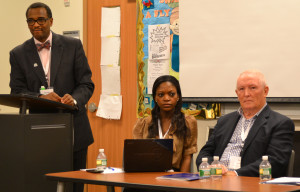Immigrants face an endless list of challenges. But at a recent panel discussion, panelists reminded listeners to recognize the success many immigrant entrepreneurs experience and the economic contributions they make.
“The best way to predict the future is to make the future,” said Fred McKinney, president of the Greater New England Minority Suppliers Development Council. “I think a lot of immigrant entrepreneurs come with that in mind””to make their own future. They”™re determined to be successful.”
Moderating the panel at Housatonic Community College, McKinney said in many ways the U.S. is lucky to attract so many immigrants as the type of person to emigrate is often highly motivated, talented and bright. In the last 20 years, immigrants helped start 25 percent of all public companies in the U.S., worth $500 billion to the national economy, according to the National Venture Capital Association.
Whether emigrating from Ireland in the 1950s or Ghana in the 1990s, many have managed to achieve the American dream despite the roadblocks. At the event, held by the Fairfield County Community Foundation, two immigrants shared their personal stories of emigrating and the successes they had starting a business.

Carl Shanahan, now president of Shamrock Building Services in Stamford, said he first came to the U.S. in 1958 with just $2.80 to his name.
“Obviously you don”™t come with a lot of money, so you”™re first job is to get a job,” Shanahan said.
Quickly Shanahan did get a factory job and then began buying and starting new businesses: a newspaper delivery service, a liquor store and then a janitorial service he called Shamrock. When large companies from New York City started to settle into the community throughout the late ”™60s and ”™70s, Shanahan positioned himself as the preferred local janitorial service.
“I didn”™t find any resistance when I came into a company,” he said. “They admired me for my entrepreneurship. I didn”™t feel any prejudice; no one ever cut me off because I spoke different. I”™m not sure that”™s the case for everyone. Maybe I was oblivious to it, but I could go in confident. If I lost a contract, it wasn”™t because of who I was. It was for a justifiable reason.”
Tearing up, Shanahan continued.
“I had $2.80,” he said. “I have a lot of money today. But it all started here.”
Growing up in Ghana, Vincencia Adusei said she and her classmates used to watch “The Cosby Show” and dream of moving to the U.S. Then as a teenager she and her family were awarded green cards to move to New York City. She enrolled in high school and quickly began preparing for the opportunity to go to college.
“All of this, in my country, was like a dream,” she said.
Then after watching “Will and Grace,” Adusei said she knew she wanted to start her own business, just like Grace in the show. She eventually obtained an MBA from the University of Bridgeport and successfully started and developed three businesses, just as she had dreamed of doing.
Today she serves as the president of VASE Construction L.L.C. and VASE Management L.L.C. in Bridgeport, which helps construction companies secure contracts.
“I never felt like I couldn”™t do something because I”™m not from here,” Adusei said. “I knew everything I wanted to do was a challenge. I just had to set my mind to it ”¦ I feel like I wouldn”™t have been able to achieve what I have without being here.”
After the panel, McKinney said he felt Shanahan and Adusei offered compelling stories.
“They came here with their eyes wide open,” he said. “They did not perceive any discrimination against them because of their immigration status, which is not uncommon in the immigrant business community.”
Shanahan may have been Irish, but still he was a part of the white majority, McKinney said. And Adusei came from a country where everyone looked like her and there is no notion of being a minority.
“They don”™t see the problem (of discrimination) so they didn”™t experience it,” McKinney said. “That can be a tremendous advantage to them. They”™re not restricting themselves because of a self perception that they are a minority. They consider themselves to be a majority.”






















Connecticut Against Violence is so proud of Vicencia Adusei who also serves as a board member for CAV. to help fight violence in our community